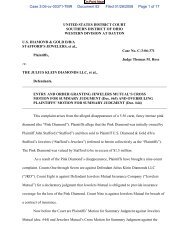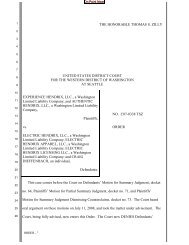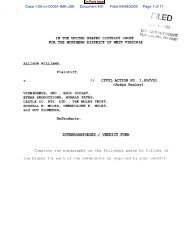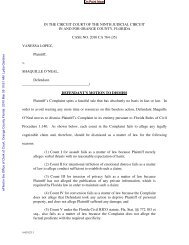GORDON KEENE VELLA. - On Point News
GORDON KEENE VELLA. - On Point News
GORDON KEENE VELLA. - On Point News
Create successful ePaper yourself
Turn your PDF publications into a flip-book with our unique Google optimized e-Paper software.
[S]etting aside the question of whether these people’s reports were or were<br />
not false, it is not possible to state with confidence that any of the people<br />
“completely forgot the abuse.” In other words, the error rate for<br />
diagnosing “dissociative amnesia” in the studies could effectively be as<br />
much as 100%.<br />
(Id.)<br />
Indeed, Dr. Brown’s “passing off” his accuracy error rate as an error rate applicable to<br />
the theory of repressed memory itself represents an overt misrepresentation, and Dr. Pope’s<br />
characterization of it as being only “misleading” is generous to a fault.<br />
The distinction between the theory itself and the accuracy of recovered memories is a<br />
critical distinction and must not be overlooked, especially not in the present case. The question<br />
of whether or not the “memories” are accurate, while relevant to the question of liability, does<br />
not address the statute of limitations issue in this case. In fact, Dr. Brown’s representation of<br />
error rate was in response to a question regarding the underlying hypothesis and not the<br />
purported accuracy of allegedly recovered memories. The desire for an articulated error rate for<br />
the hypothesis flowed naturally from the fact that Dr. Brown’s entire premise, and indeed the<br />
ability to maintain Plaintiff’s case, was predicated upon the validity of Dr. Brown’s hypothesis<br />
that an individual can “completely” forget or repress a memory and then fully recover that<br />
memory years later. 6<br />
(See Filing 225, Mem. & Order on Summ. J. at 15-17) (finding that Dr.<br />
Brown’s testimony created genuine issue of material fact as to whether Plaintiff had, in fact,<br />
been unable to access memories until long after limitations period ended.)<br />
6<br />
“Dissociative amnesia” refers to the hypothesis that an individual could develop<br />
amnesia for a traumatic event, such that the person was unable to remember the event<br />
afterwards. The term does not apply to individuals who simply tried not to think about<br />
an event, or who had simply not recalled the event for a long period of time, but who<br />
would have been perfectly capable of recalling the event if specifically asked about it.<br />
(Pope Decl. 9.)<br />
- 11 -
















